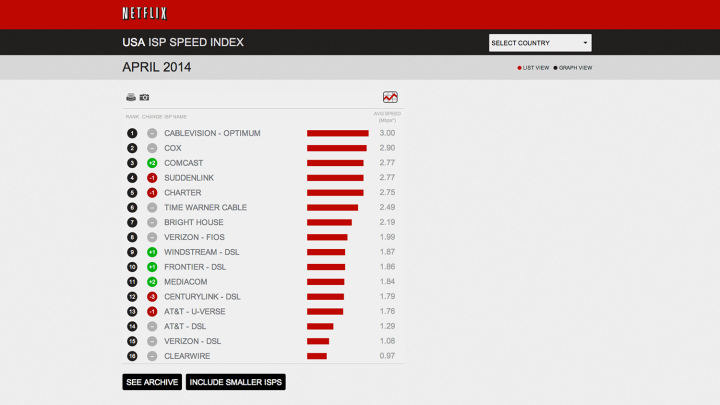
This week Netflix released the April numbers for its Netflix ISP Speed Index, and – perhaps surprisingly to some and predictably to others – Comcast again rose in the ranks, this time landing the #3 spot on the list, behind Cablevision and Cox Communications, respectively.
The newly updated rankings come just days before the FCC’s vote for a controversial new net neutrality proposal, and once more raises questions as to whether Comcast – and other ISPs – have been practicing the nasty habit of purposely throttling video content to extract payment from services that want to access their cache of broadband customers.
The jump in rankings is the second bump for Comcast since Netflix handed over an undisclosed sum of cash to the conglomerate to alleviate streaming woes after progressive stuttering, buffering and speed problems for Netflix customers who use Comcast as their service provider.
Less than a week after the deal, our streaming quality via the service drastically improved. The boost was undeniable, but it was also difficult to isolate, and could simply be attributed to regional differences. However, when Netflix released the March numbers for its ISP Speed Index last month, the writing on the wall became crystal-clear. Comcast jumped six spots over the previous month to land in the #5 position.
Comcast has since denied Netflix’s assertion that the company is directly responsible for the slow streaming rates, citing its “multiplicity of other agreements” with services that have not harmed customers or increased costs for content providers. Still, many advocates for net neutrality see direct deals like the one Comcast has made with Netflix as a troubling precedent that could lead to a fast-lane/slow-lane Internet, providing unfair advantages to larger companies who pay up for faster connection.
Netflix also made a similar agreement with Verizon, which has also been implicated for intentionally throttling video services, with increasingly slowing streams on its network as evidence that something fishy is going on. After the Comcast deal, Netflix CEO Reed Hastings decried such agreements via blog post in an urgent plea for net neutrality.
Tomorrow’s FCC vote for a new net neutrality proposal will address these very issues, so we’ll soon see if the commission comes up with a solution that will placate concerns from a host of net neutrality advocates, as well as large players in tech like Google, Yahoo, and others. Stay with us as we follow these unfolding developments.


